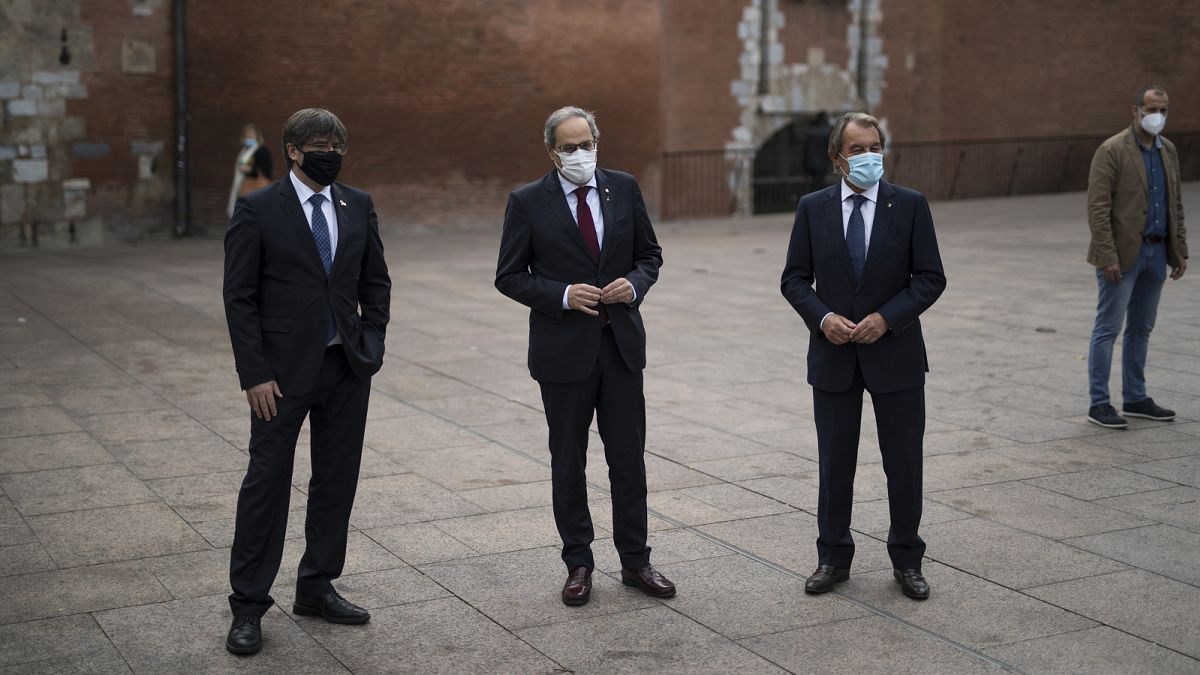The meeting of three Catalan presidents stripped of their offices or the right to hold office has become symbolic of how Catalan democracy is being treated by Madrid.
On Friday October 9, an unusual image was taken in Perpignan, the capital of French Catalonia. Three Catalan presidents, side by side, held a press conference to denounce that all three of them had been victims of the repressive workings of the Spanish state apparatus.
None are the president of Catalonia any longer, according to Spanish law. All have been banned from holding public office, either during their tenure or just after their time as presidents. Their crimes are "political": organising a non-binding consultation on independence in 2014 in the case of Artur Mas, organising the self-determination referendum of 2017 in the case of Carles Puigdemont, and hanging a banner on the balcony of a government building saying "Freedom for political prisoners and exiles" for three days during the Spanish general election 2019 in the case of Quim Torra.
The meeting was in Perpignan because, although Puigdemont is an MEP, Spain does not respect his immunity and would be arrested and jailed on the spot if he crossed the border.
The cases of Mas, Puigdemont and Torra are indeed an anomaly in Europe. Spain’s judiciary "acting for the benefit of Spain" as its head, Carlos Lesmes, recently said, has taken on an ideological crusade against the Catalan pro-independence leaders. It’s not relevant anymore if they are "independent" from other powers (they are not) but how ideologically biased are they.
The reason why they have kept Catalan leaders in prison, forcing the rest to exile, is not showing respect for the law but the will to punish them for daring to contest the democratic legitimacy of the unity of Spain. No one in Spain’s judiciary cared that both Amnesty International and the UN Working Group on Arbitrary Detentions called for the release of prisoners. In its most infamous act yet, prosecutors demanded the "re-education in the Constitution" of Catalan political prisoners in order to allow them to leave prison for a few hours a day.
It has never been as clear as it is now that Catalonia is a national minority inside Spain, one which suffers from the intransigence and political intolerance of the Castilian-speaking majority whose power is based in Madrid. All the attempts of the last 15 years to find institutional accommodation for the hopes of more Catalan self-government or self-determination have failed, and today references to "the law" or "the Constitution" are code words to threaten those who dare to question the status quo.
The lack of reform in Spain’s judicial system after the end of Francoism certainly helps. In any case, it’s more obvious than ever today that even if all Catalans agreed on a constitutional change, such change would be remorselessly blocked by the Spanish majority and its judges.
Current politics, grounded in the here and now, may prevail with the thinking that all this will be solved by a new generation that will overcome the traumas of the past. But that is a fallacy that does not hold. One has only to look at today’s young Spanish leaders, most of them are aggressively anti-independence to the point of applauding the jailing of rivals. The Spanish ideologically-driven nationalist mainstream, with its tight control over the media, is so firm that 45 years after Franco’s death, Catalan languages are still forbidden in the Cortes, the Spanish parliament.
Knowledge of Catalan and Spanish history gives us some clues to understand the present. Of the last 12 Catalan presidents, 10 were at some point in their lives either jailed, exiled, or brought to trial. One of them, Lluís Companys, was executed by Franco after being given up by the Nazis and then condemned in a military trial on October 15, 1940.
Their cases are indicative of what has happened to those who have defended the Catalan language, self-government, or right to self-determination over the last 120 years. Looking further back in history would be even worse, as the Spanish Bourbon King Felipe V, founder of the current ruling dynasty and predecessor of the current king, Felipe VI, began the liquidation of all Catalan institutions from 1716.
History doesn’t repeat itself, but it certainly rhymes. Many Catalans thought that the ghosts from our past were over, and with the arrival of democracy, everything could be called into question if done through democratic means. Obviously, that was a mistake, and the madness of Spanish nationalism is as strong as ever with all its authoritarian consequences. Europe should wake up too: Spain can be a democracy in many different ways but not when it comes to the treatment of Catalonia and its people.
Telling Catalans that they should follow normal procedures to change Spain’s constitutional order is nonsense as the will of Spain’s national majority is to block any opening towards Catalonia.
Will Europe react or does it just not care for national minorities? The persistent troubles of Catalan presidents are an echo of the troubles of the Catalan people in trying to have a normal democratic life inside Spain and are the best indicators that something is indeed rotten in Madrid’s legal and political system.
- Aleix Sarri Camargo is a former International Affairs advisor to the President of Catalonia and current International Affairs Officer for the Junts per Catalunya (Together for Catalonia) party
_____________
Are you a recognised expert in your field? At Euronews, we believe all views matter. Contact us at view@euronews.com to send pitches or submissions and be part of the conversation.
